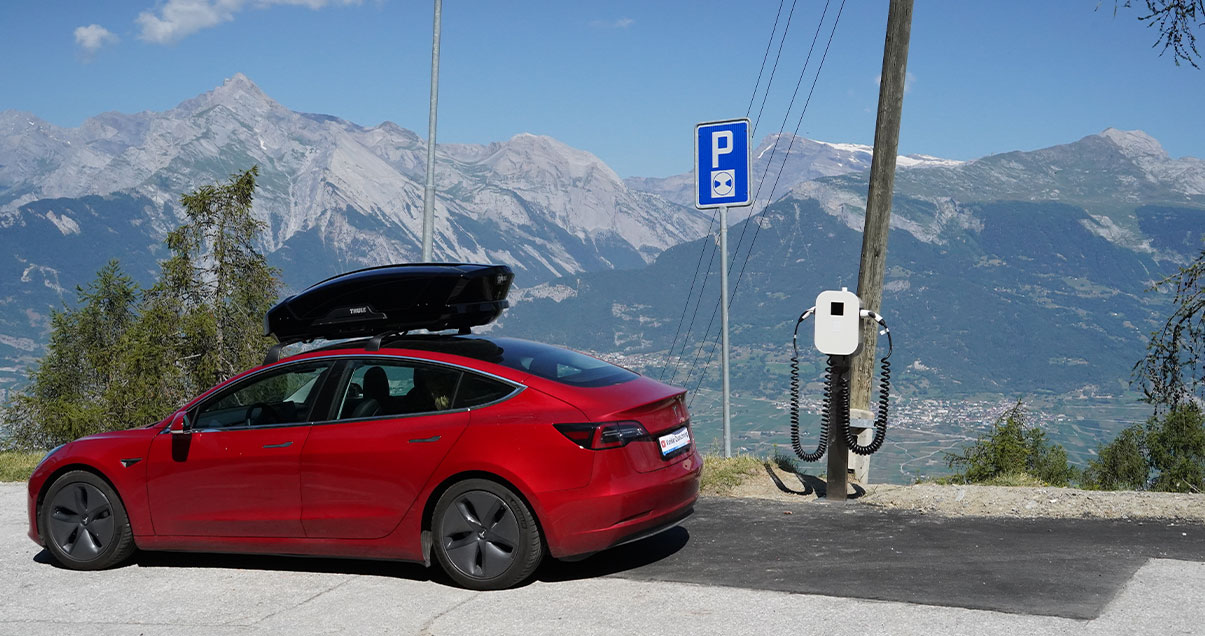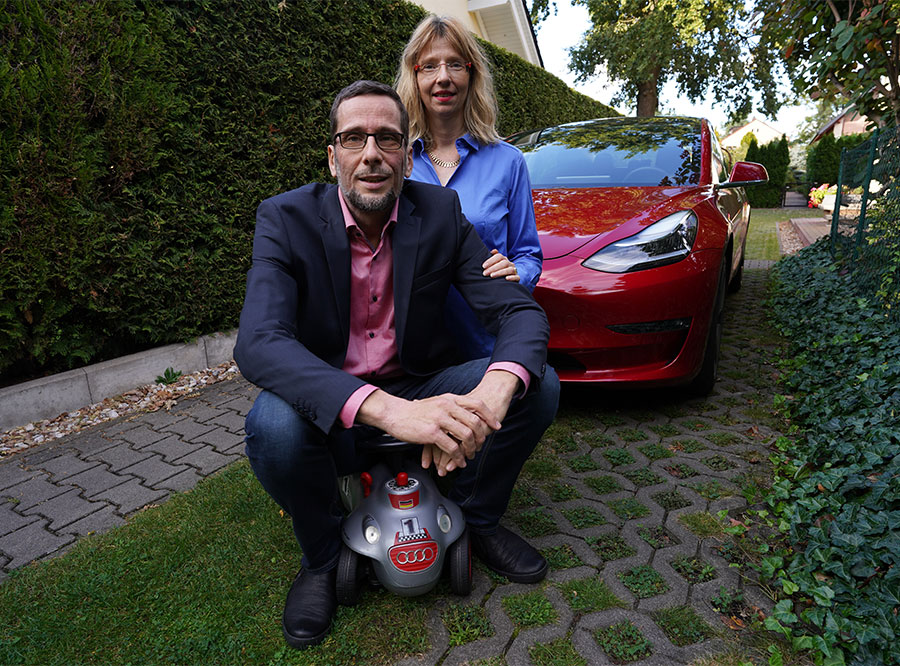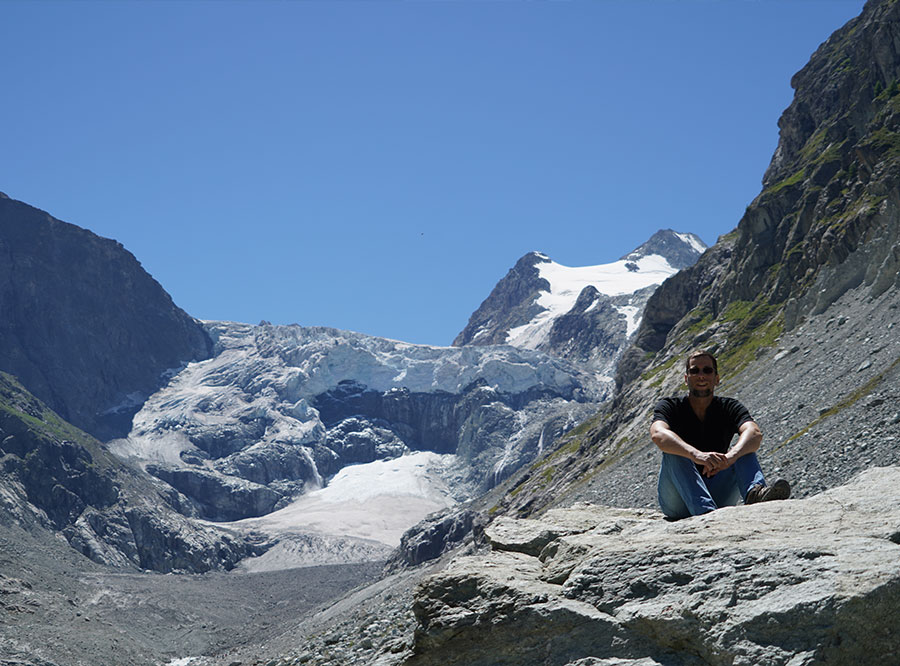Cornelia and Volker Quaschning in interview

Volker Quaschning is Professor of Renewable Energy Systems at the HTW Berlin University of Applied Sciences and one of the key protagonists of the German energy transition. As such, he also appears in entertaining documentary videos that show the energy transition and climate protection are feasible. Of late, he has been joined by his wife Cornelia Quaschning, also a climate protection activist for decades, as a co-star in the videos and for their joint podcast. In this interview, the couple talks about helicopter parents, status symbols in Berlin’s suburbs, habits that are difficult to change and sometimes needing the courage to take risks.
Professor Quaschning, Ms. Quaschning, this summer you documented your vacation trip from Berlin to Italian-speaking Switzerland in an electric car on YouTube. How long did you need for charging – wasn’t it highly inconvenient?
Volker Quaschning: Not at all. On the journey of around 1,200 kilometers, we needed the best part of two hours in total for charging using fast charging stations – no longer than the breaks you would take anyway. It always worked at the first attempt and was not really complicated. However, it does require a little preparation and the right charging cards. Then we also needed a little additional time to shoot our videos. But you can’t really blame the electric car for that (laughs).
How did the video project come about?
VQ: We have been carrying out research on the energy transition and climate protection at HTW Berlin for a long time now. But essentially it then founders on the implementation. For that reason, you just have to leave the ivory tower sometimes. When our electric car was finally delivered a few months ago, we decided to make a documentary video of our holiday together. It is also much more authentic as a family. Our motto is “let us lead the way” – maybe we can inspire others. It should be fun, and people get the scientific facts mixed in as well.
What exactly made it fun? With three children and luggage, surely you reach your limits at times – did these provide challenges or funny situations?
VQ: For our children, the journey and charging were a real adventure that they really enjoyed. They are big fans of the electric car, and our eldest daughter even helped with the video shooting. We found it particularly funny that once, as the driver of a diesel car started his engine right next to us, our eldest daughter jumped to one side in horror and said, “It’s incredible how loud these old cars are. I had totally forgotten that already.”
But the fact that you are taking part in the videos, and also in the podcast, Ms. Quaschning, is a new development.
Cornelia Quaschning: As far as public appearances are concerned, yes. But we have both been climate protection activists for decades and are a good team in that arena. Ever since it was founded, I have been very involved in Parents for Future, which champions future generations. As a family, we would like to provide an example: we travel by bicycle a lot anyway, use public transport and did not have a car for many years.
In the late 1990s, I worked as a computer scientist in the sales department of a major computer company. I wanted to decline the company car back then, but could not because my colleagues feared also having to do without their status symbol. Then, I pointedly used to leave the car in the company parking lot on a regular basis.
“With the electric car, we are showing that there is another way”
Is it realistic to do without a car completely?
CQ: In the short time that we have left to achieve the climate goals, you will not be able to get everybody to do without their cars completely. To travel only by bicycle or on public transport – we could not convince those around us to do that. That is why we opted for an electric car. That way we are showing that things work without a diesel- or gasoline-powered car.
Your children are not visible in the holiday video but were there.
CQ: The children are also engaged in climate protection. After all, they practically grew up with the topic through us. For example, our middle daughter was essentially responsible for the fact that we now eat a vegan diet. In some families, the children go to Fridays for Future demonstrations and influence their parents. With us, it was more of a collective process.
VQ: In our family, everybody has their own niche. For example, our other daughter sees to it that we avoid plastic. But, of course, the parents make the major decisions like buying a car (laughs).
Up to now, only a few people have managed to live with no plastic at all…
VQ: Plastic-free and vegan together definitely do not work. Some alternatives to meat are available only shrink-wrapped in plastic. I think you need to make compromises everywhere. We try to do it as well as possible.
You drive a Tesla. Not everybody can afford one of those. Isn’t that also a status symbol?
VQ: We do not live in the richest part of Berlin. Nevertheless, many families here now have two cars with internal combustion engines that together cost more than our electric vehicle. Our family of five has only one car that is barely used in comparison. We travel by train mostly.
CQ: With Tesla, everybody thinks of the most expensive model straight away. We have the more favorably priced Tesla 3, that is comparable with a large VW…
VQ: …Audi or BMW. Incidentally, you see lots of those here in the suburbs.
“Unfortunately, almost everybody here drives to work by car”
What do you think about car-free city centers?
VQ: Any time! We don’t drive into the city in the car anyway, and if we lived in the center of Berlin, we would not even have an electric car. It would be parked up three blocks away and would probably move only once every three months. Unfortunately, almost everybody drives to work by car here in the suburbs. Local public transport is mostly used only by students – if at all. For example, we had decided that our son would travel to school by tram from the first grade onward. But he was completely on his own in doing that; all the other children were driven to school in the car.
Did you then put your son on the tram regardless and have him travel alone?
VQ: We had thought that he would simply get off near the school with the large number of other children – even without being able to read. So we had to wait a good year longer until he could also cope with possible unusual situations on the tram journey by himself.
Helicopter parents are a common phenomenon, aren’t they?
VQ: They are indeed. However, the car provides only a subjective feeling of security. Recently, a child was run over by another parent in an SUV right outside the school. It is a verifiable fact that more children come to harm as occupants in a car than on foot or on board a tram.
CQ: It also promotes their independence if you trust your child to do something once in a while. As a therapist, I frequently notice how much the anxieties of parents are rising. They do incredible harm to their children as a result.
“You would need to eliminate all the factors preventing us from achieving the climate goals”
In your podcast, you call for the energy revolution. What exactly do you mean by that?
VQ: “Energy transition” sounds a little bit innocuous and languid. Indeed, we need to get our act together in radical fashion – I mean, we need to make a U-turn very quickly to be climate-neutral in the next 15 or 20 years. To that end, we would need to eliminate all the factors preventing us from achieving the climate goals. We need a completely new system in the energy sector with disruptive changes – that can be thoroughly positive. And then you are talking about more of a revolution than a transition. In the area of transportation, it would mean banning the sale of new vehicles with combustion engines immediately, if possible – which surely would not be very funny for the automotive industry.
Is banning cars with combustion engines in the near future a realistic prospect?
VQ: I think many people just cannot imagine that. They firmly believe that things simply will not work without cars powered by combustion engines.
“We also have all gotten used to traffic lights”
CQ: I don’t see it being so difficult at all. Many things simply had to be banned in the past. We also have all gotten used to traffic lights. Likewise the mandatory wearing of seat belts or the ban on smoking in restaurants. That is exactly what we need for climate protection, because this is about nothing less than our survival. In terms of e-mobility, you could say that we in Germany have completely squandered 30 years. The automotive industry could have had plans on the agenda long ago – now it is finding it difficult to keep up with competitors from abroad.
VQ: Once electric cars cost less than those with combustion engines, the shift will take place very quickly. Half of all car owners have their own parking space and are already able to charge easily. For the other half, politicians would have to create the necessary framework conditions and solutions. In addition, the pressure to protect the climate is going to increase.
“Here, there is a predominant feeling that the German economy is invulnerable”
At the same time, of course, it is also about the survival of Germany as an industrial hub. Tesla’s comprehensive strategy includes low-cost charging and its own batteries; the German automotive manufacturers are unable to offer that. Over here, there is a predominant feeling that the German economy is invulnerable. At the same time, history tells us that there have been similar disruptive events in the past – with the closure of the coal mines in the Ruhr area, for example.
“It is fascinating how Tesla is breaking all conventions”
Have the German carmakers missed the boat in your opinion?
VQ: I think that theoretically, all manufacturers – with VW leading the way – have understood that time is of the essence, but the development cycles are long. It is fascinating how Tesla is currently breaking all conventions as it builds its factory near Berlin. Major and rapid changes seem inconceivable in Germany – look at Berlin Airport. Then an American group comes along, buys itself a timber plantation, and one and a half years later – or so it seems – 100,000 cars roll off the production line. Germany could follow the example of this dynamism.
At the moment, there is quite a bit of opposition to the Tesla factory. Isn’t it a contradiction for you as a climate protection activist to be praising the project like that?
VQ: I am surprised that drivers of diesel cars of all people are getting upset about the Tesla factory. That seems inconsistent to me. If we want to achieve any climate protection goals at all despite our obsession with cars, there is, as mentioned earlier, no alternative to banning diesel and gasoline cars and completely replacing them with electric cars and public transit.
Why is the construction of the Tesla factory advancing so quickly, while other major projects in this country make only sluggish progress?
VQ: For me it is clearly a question of mentality. “That is not possible, that will not work” is embedded quite firmly in the minds of Germans. And then there is also German thoroughness. Berlin Airport is bogged down in a mire of bad planning and rescheduling as well as a lack of responsibility – and everybody is familiar with the result. Tesla, on the other hand, is simply building, with a clear strategy. That is even though the building permits are only provisional, and at the risk of theoretically having to tear the plant down again. In case of emergency, plan B will simply take effect.
CQ: I perceive this lack of vision across the board in Germany, in politics as well as business. In addition, communication plays a key role. You have to involve the people.
VQ: At the beginning of the coronavirus crisis, you could even say that was a success. In the first few weeks, the government listened to scientists very closely and communicated a lot. Then, when there were no further press conferences, resistance from the people increased. When there are changes that people find it hard to conceive of – which also applies to the energy transition – they simply have to be explained and well-founded. To take people with you, you could, for example, hold a weekly press conference on the energy transition – similar to those for the coronavirus – and instead of short nightly briefings covering financial news, you could broadcast a rundown on the situation with the climate crisis.
CQ: In my view, it is also very important to make politics accessible to the young generation. Because it is they who will be most affected by the long-term decisions that they are not permitted to have a say on in elections.
Are we still going to achieve the climate goals?
VQ: I am an eternal optimist. Technically, it is possible, and the coronavirus crisis has shown that governments can be flexible when they want to be. We still have a small realistic chance. But the window of opportunity is slowly closing because our ability to increase the speed at which the measures are being implemented is limited. In five or ten years, we will definitely no longer be able to keep to the 1.5-degree limit.



